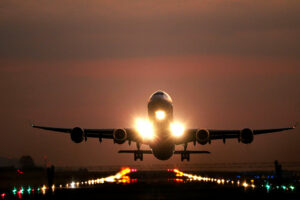By Ashley Erika O. Jose, Reporter
GROWTH in the Philippine aviation sector may slow due to the ongoing conflict between Israel and Iran, which is projected to result in flight disruptions and fare surges, analysts said.
“The conflict between Israel and Iran, coupled with its ripple effects such as the closure of airspace across the Middle East, could pose significant challenges to the Philippine aviation sector,” Globalinks Securities and Stocks, Inc. Head of Sales Trading Toby Allan C. Arce said in a Viber message on Sunday.
This followed the temporary closure of airspace by several Middle Eastern countries last week after Iran attacked a United States military base in Doha, Qatar, prompting some airlines to cancel or reroute flights.
Flag carrier Philippine Airlines canceled its Manila flights bound for Doha, Dubai, and Riyadh that were scheduled for June 24.
“There is always some effect when one destination is compromised, but it differs in degree. Of course, the Philippines being a Christian country is a thing to consider since many Filipinos want to visit the Holy Land, but overall, it should not be something which will affect us that much,” Nigel Paul C. Villarete, senior advisor at technical advisory group Libra Konsult, Inc., said via Viber on Friday.
Rene S. Santiago, former president of the Transportation Science Society of the Philippines, said flight disruptions are already occurring, with airport hubs in the United Arab Emirates being affected.
“The biggest impact on Philippine aviation is the higher cost of fuel, leading to fare surges that could dampen domestic demand,” Mr. Santiago said in a Viber message.
According to a June 2 report by the International Air Transport Association (IATA), the airline industry — particularly in Asia — is poised for growth, driven by falling jet fuel prices and the easing of visa restrictions.
However, following the escalation of tensions between Israel and Iran, the global average jet fuel price rose by 12.9% week on week to $96.97 per barrel as of June 20, based on IATA’s jet fuel price monitor.
“Airlines, aviation businesses, and related industries are vulnerable to volatility in global crude oil prices, since aviation fuel accounts for a significant portion of their cost structure. Therefore, hedging fuel requirements has always been a prudent measure to better manage costs,” Rizal Commercial Banking Corp. Chief Economist Michael L. Ricafort said in a Viber message on Sunday.
Mr. Arce of Globalinks Securities said any flight disruptions and a prolonged increase in fuel costs would weigh heavily on the growth projections of Philippine carriers.
“Philippine airline companies, which have been projecting growth amid the recovery from the pandemic, may face downward revisions in their growth forecasts. Stocks of these companies could witness heightened volatility as investors weigh these uncertainties,” he said.
Earlier, stock market analysts said airline operators are projected to post higher revenues in the second quarter amid strong travel demand and higher passenger volumes.
“The conflict could temporarily slow the projected growth of the Philippine aviation sector. However, the long-term impact will depend on the conflict’s duration and the speed of geopolitical resolution,” Mr. Arce said, adding that companies capable of implementing cost-saving measures may be able to mitigate the impact of these challenges.
PAL Holdings, Inc. reported a 20.28% year-on-year increase in attributable net income to P4.33 billion for the first quarter from P3.6 billion a year earlier, driven by revenue growth.
Cebu Pacific, operated by Cebu Air, Inc., posted an attributable net income of P465.9 million for the first quarter, down by 79.19% from P2.24 billion in the same period last year, due to rising expenses despite double-digit revenue growth.

